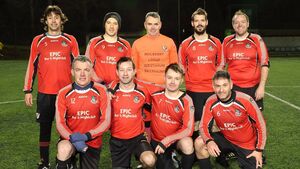Local notes: 'People can’t be let leave buildings in a derelict state'

The Ballyhaunis Town team who commenced their Mayo FA Masters League campaign at Umbro Park, Castlebar last Wednesday where they were beaten by Claremorris AFC. Picture: Michael Donnelly
Mayo County Council has demanded payment of a €9,485 derelict sites levy placed on a building on Bridge Street which is also on the Council’s list of derelict sites.
The figure is an accumulation of an annual levy of seven percent of the site’s market value – which in this case the Council puts at €40,000, meaning the dereliction levy is equal to quarter the value of the property.
A notice posted on the window of the building alerts the owner of the building that interest of 1.25 percent per month applies to unpaid levies. Signed by the head of the environment, agriculture and climate division at the Council, the letter also states that the levy remains with the property and “may effect terms of sale if the property changes hands.”
The Bridge Street property was first added to the registry of derelict properties in July 2019. Dereliction notices are issued under section eight of the Derelict Sites Act 1990 by Mayo County Council to owners of properties regarded as neglected or unsightly ahead of any posting of a public notice on the property, giving the owners an opportunity to complete works and improvements. Properties on the dereliction list can be removed after improvements are inspected by the Council and levies are paid.
In some cases owners of properties listed as derelict are refusing to engage with the county council, said Ballyhaunis estate agent Kevin Kirrane.
“Some properties are not registered so the council can’t find the owners. If people can’t afford to bring the properties back into use then they should sell them off.”
A potential next step open to the Council is a compulsory purchase order “which costs the council a lot of money, time and resources,” explained Kirrane.
“People can’t be let leave buildings in a derelict state, especially when there are generous grants available now to put them back into use and a waiver on planning permission to convert commercial to residential if it has been vacant for more than two years.”
In the context of dereliction Kirrane believes the Council should also take a look at their own property on Upper Main St, boarded up since last April when its front window was broken.
“It’s sitting there for months boarded up and all it needs is glass. That unit should be put into full time use or converted to residential.”
The operations manager of the Dawn Meats group, which runs a large plant in Ballyhaunis, told a recent Bord Bia conference that Ireland will reap “huge opportunities” from a fall in cattle numbers across Europe.
Philip Tallon, operations manager at Dawn Meats, told the launch of Bord Bia’s Export Performance and Prospects Report for 2024/25 that fewer cattle in continental Europe will mean more demand for Irish supply. However, he also said that closure of restaurants and higher cost of living had dented demand for steaks in both Ireland and the UK. McDonald’s is a major purchaser of beef processed at the Ballyhaunis plant operated by Dawn Meats.
Tallon also told the Bord Bia conference that the industry was struggling to find workers for what is a “very labour intensive” industry. Securing permits for non-EU workers is costly, said Tallon. Dawn relies on a large Brazilian immigrant workforce for its Ballyhaunis operations.
The government last January announced a quota of 1,000 General Employment Permits allowing meat companies to hire non-EU citizens for the position of meat processing operative, a quota that was filled by mid-November.
Painting and electrical maintenance works at St Patrick’s Church has necessitated the closure of much of the church during weekdays. The Pastoral Council aims to have the bulk of Phase One of the project completed in time for Holy Week, commencing on April 14. In the meantime, weekday masses are officiated across the road from the church in the Community Hall, also known as the parochial hall, which the diocese handed over to Ballyhaunis Community Council in 2016.
“We are blessed to have such a beautiful church building that has been handed onto us by previous generations who built and maintained the church in difficult, less prosperous times,” said Fr Stephen Farragher, local parish priest.
Two Ballyhaunis properties have switched to heat pump heating systems so far this year, taking advantage of a new tax cut on installations. The VAT rate applied to the supply and installation of heat pump heating systems has been reduced from 23 percent to 9 percent from January 1. Run on electricity, heat pumps are being promoted as a low-emission alternative to boilers run on kerosene oil. Homes have to be well insulated however: one of the Ballyhaunis properties recently had external insulation applied.
An increasing reliance on non-EU migrant workers in various sectors of the economy is leading to an increase in exploitation according to an advocacy group which has assisted workers from Ballyhaunis in understanding their rights.
“The rise in exploitation we are seeing seems to correlate with a rise in permits issued and in particular a rise of workers coming in lower paid, more precarious sectors,” Neil Bruton, campaigns manager of the Migrant Rights Centre of Ireland (MRCI) told this column.
His organisation, he said, doesn’t have any evidence that would suggest exploitation is linked to recent rises to the minimum wage for all workers or minimum salaries for permits. Government last year raised the minimum salary which companies are required to pay in order to secure a permit for a worker with €30,000 the minimum annual salary for the meat processing sector and €27,000 for the care sector.
Irish employers have come to rely on workers from South America and South and Southeast Asia for labour intensive sectors like food processing, elder care and hospitality. Government sets a quota of permits allowed for various sectors of the economy, with companies then applying for the permits to bring already recruited workers into the country. The system limits the ability of the worker (whose permit is tied to an employer) to change employer or industry. After five years a worker is entitled to permanent residency and free movement between employers.
Bruton believes workers coming from outside the EU on employment permits need better protections. “It remains very challenging for people on permits to change jobs. Employers know this, which makes it very hard for workers to stand up for their rights. Requiring workers to stay in the employment permit system for a five-year period before they have the freedom to work without a permit is too long.”
The Employment Permits Bill passed in 2024 changed the rules so that general permit holders can switch jobs more easily while staying on their existing permit. However, the worker must remain within the same industry.
“For health reasons I needed to change industry. I found work in retail but these companies weren’t allowed to hire me because of my employment permit,” explained a Ballyhaunis-based migrant with a permit to work in the meat industry who is now living off his savings while he recovers.
Bruton believes reforms last year to allow workers change employer (within the same industry) is a “very positive step forward” but it doesn’t fully protect workers.
“Firstly,” he says, “more needs to be done to ensure all workers are aware of this new right. Secondly, the restrictions on the type of job you can move to also need to be broadened in order for this to be a meaningful protection for everyone.
“The sooner people can move out of the permit system the less the chances are of seeing this type of mistreatment.”
Bruton said MRCI would like to see a reduction in the period a person is required to stay on a permit from five years to two years, meaning that after two years they would have the freedom to work in any job.
Bruton points to a poll carried out with Ireland Thinks during the month of July which indicated that 66% of people agree that ‘People from outside the EU, recruited to work in Ireland through the work permit system should have freedom to change to any job after two years.
A popular local film club will show the German tragicomedy ‘Goodbye Lenin’ (with subtitles) on Saturday, January 25 with a screening time of 8.10pm. Winner of numerous awards including Golden Globe for best foreign language film, the film tells a story of a family in the former East Germany at the time of the fall of the Berlin Wall. Entry is free. Hosted by Ballyhaunis Community Council, the screenings are shown on a cinema-quality screen and projector installed in the Community Hall with a grant from the government’s Community Centres Investment Fund. Entry is free.
The Community Council meanwhile is launching a weekly Games Evening (4-6pm) on January 26, inviting afficionados and beginners to the Community Hall for cards and board games including chess, draughts, backgammon and ludo. The event is run in conjunction with Ballyhaunis Language Café and experienced players will be on hand to show beginners the ropes. Contact ballyhauniscommunitycouncil@gmail.com for more information.
Congratulations to Cillian Freeman, Tooreen, who was the winner of €470 in the Ballyhaunis GAA 50 /50 draw on an envelope sold in MacSuairtain’s.
The next draw, on January 19, is in Paddy’s Bar.





